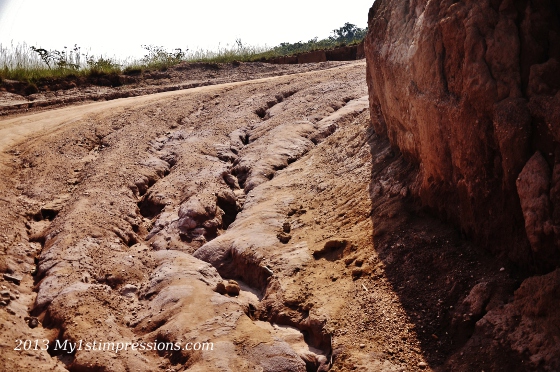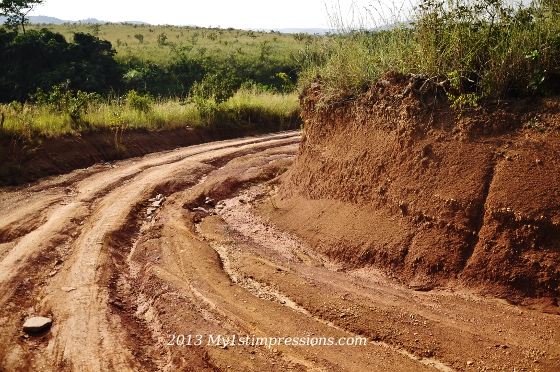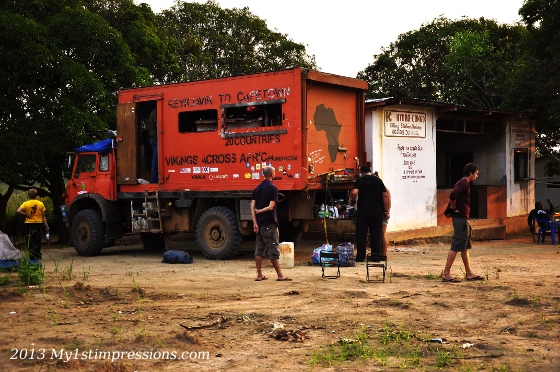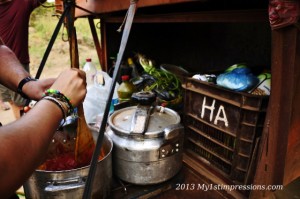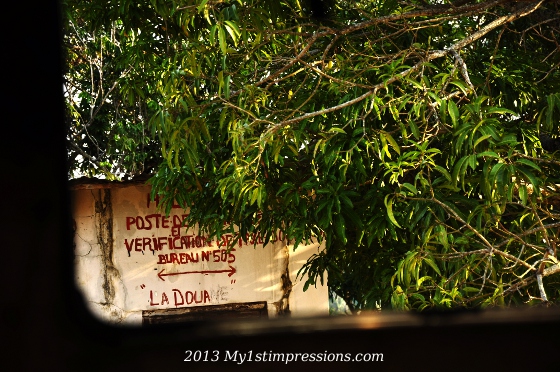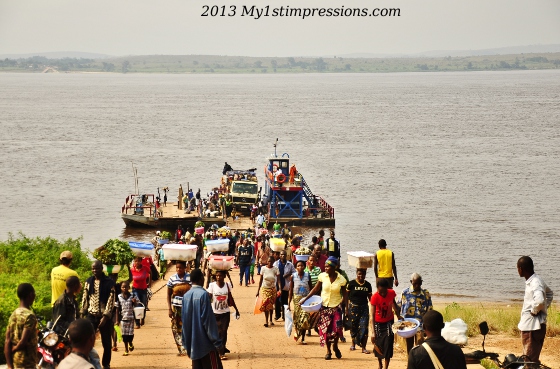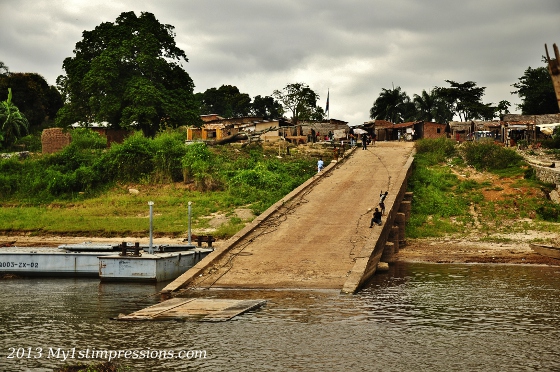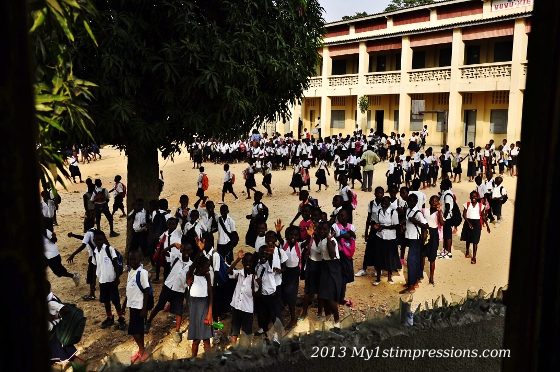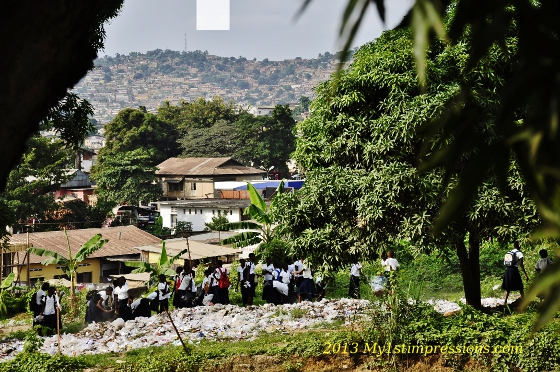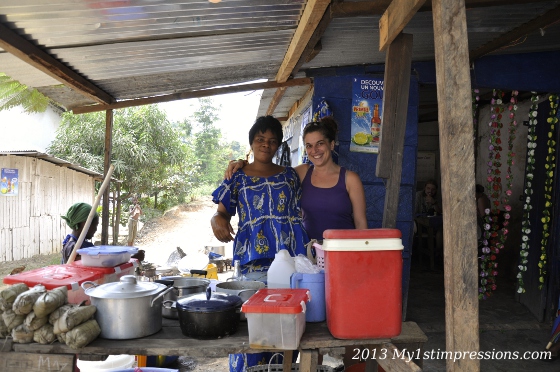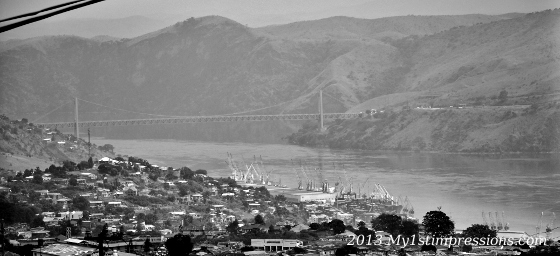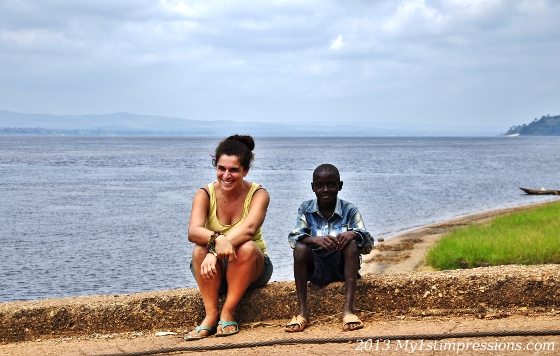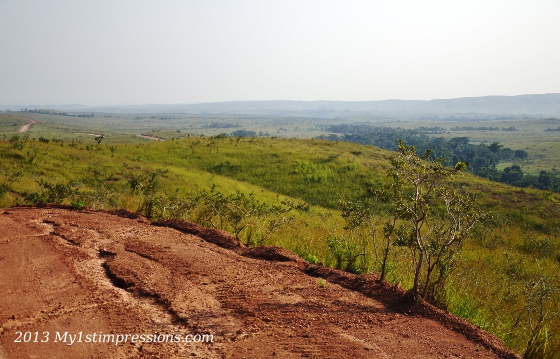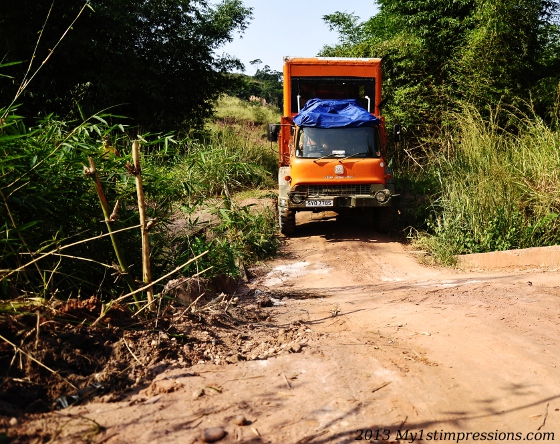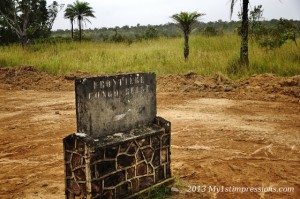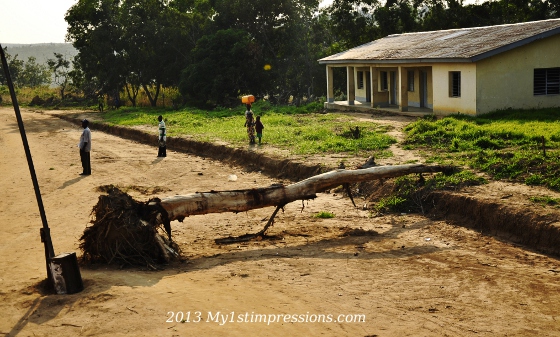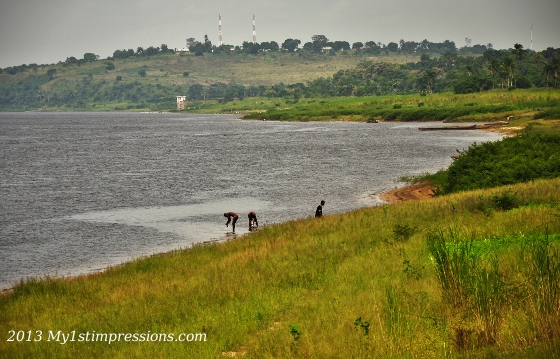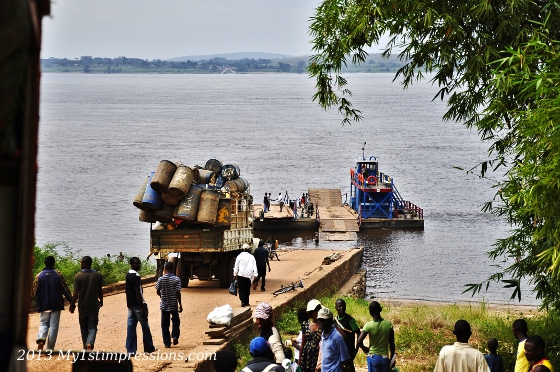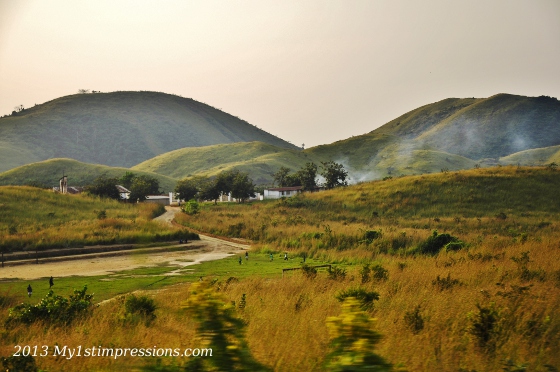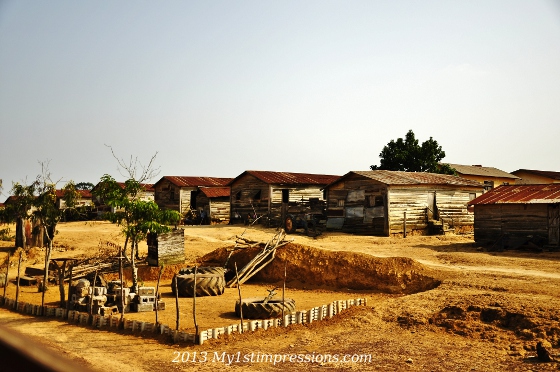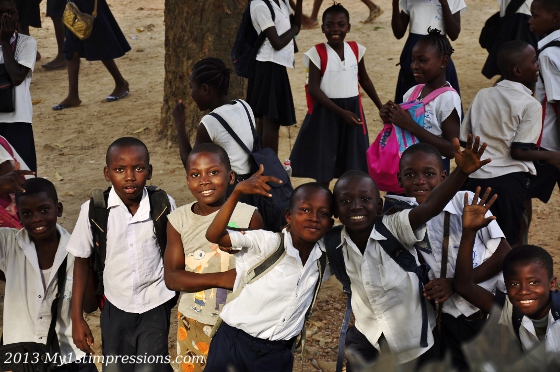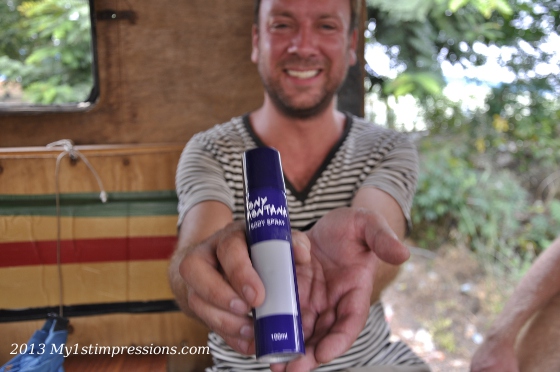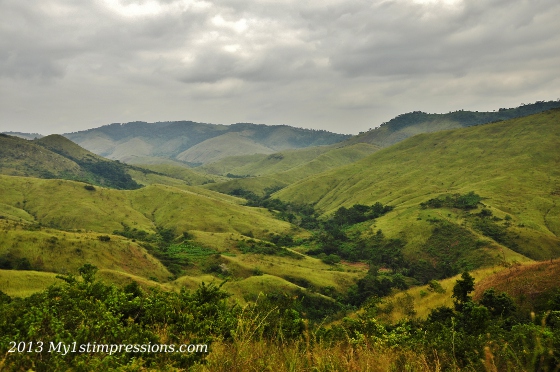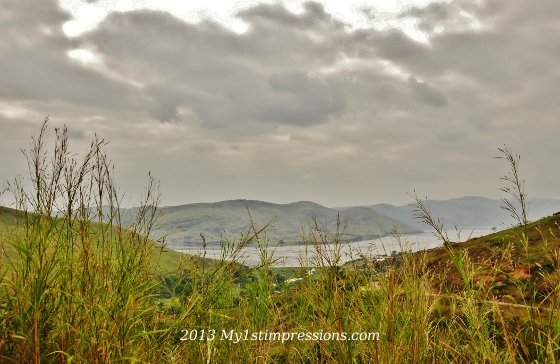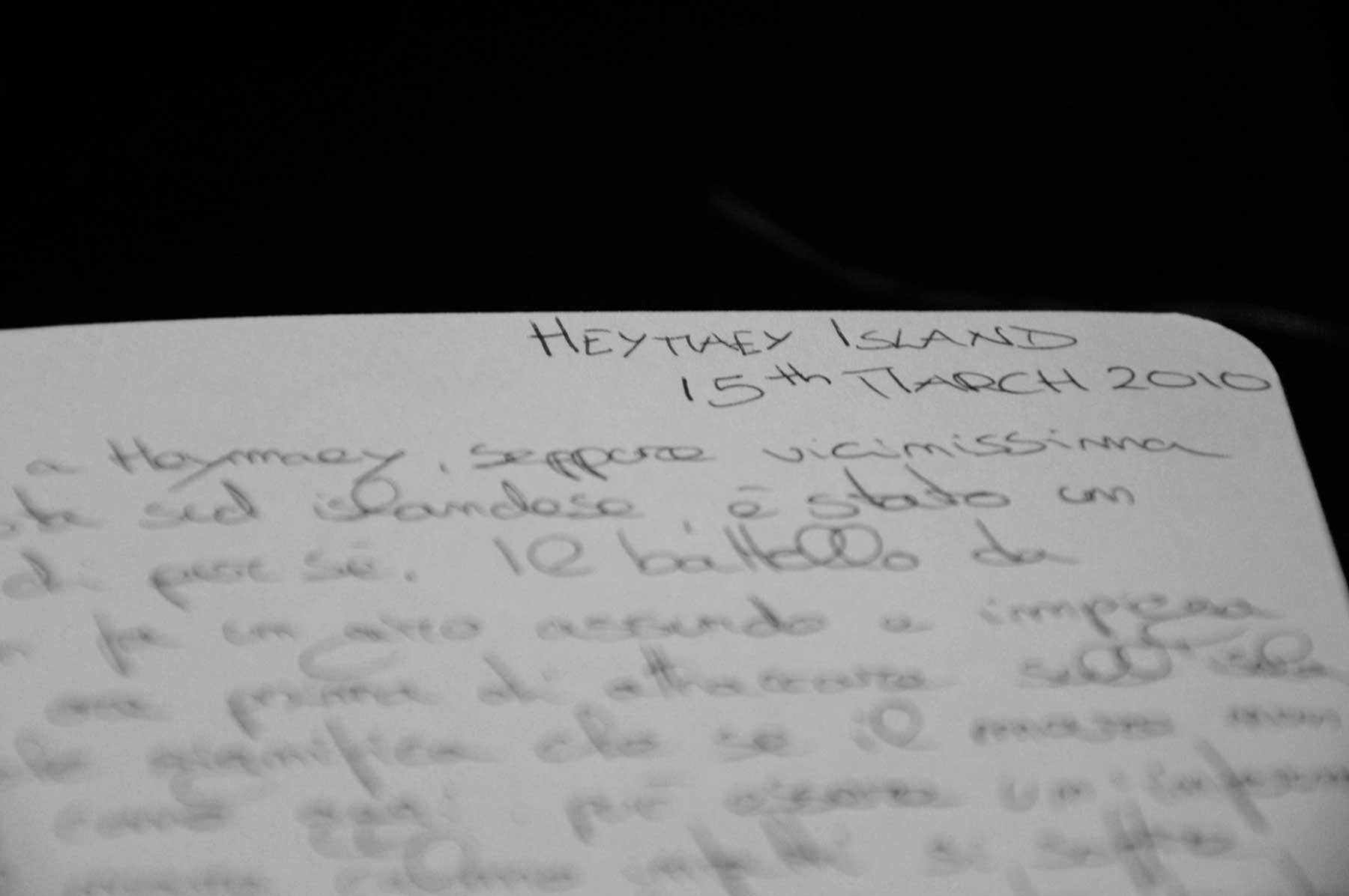We had been talking about them since the beginning of the trip, fearing them,
waiting for them, imagining them but I think none of us really thought they could really be as bad as the reality showed us: DRC bad roads. We left Congo to enter DRC on the top of the most beautiful mountains seen so far in Africa. The air was light, the sun was shining , the vibes were good among the 11 people left in the group, none of us probably really expected to have such a rough time on such bad roads like the one we crossed.
From one border to another there is a very long drive before you arrive to the town where you can get the stamp on the passport. It took us around 3 days and in such bad conditions that sometime we were alls cared the truck would have flew down the mountains. “There was a moment we were literally driving on 3 wheels” that is what Thor told us at the end of the first day. The truck was dangerously bouncing on some canions, and in case of rain we would have probably been stacked there for days. None of us dared to talk in those days, as we were too concentrated to keep us stable in the truck. Anna Begga had the worse experience ever, as she got sick and she had to lay down to the benches for the entire time we were along those roads. It’s really impressive to think about it. One of the reason why a country doesn’t have the possibility to develop is certainly the transportation system. DRC has been left abandoned for such a long time that there is no way to go from one place to another, and if there is it is so bad that some villages are isolated probably for months.
We stopped on one of these villages on the mountains, and as it was early in the morning, we went down the truck to go to luck for some food, some bread at
east, but n the village there was literally nothing. I asked a woman if they had bread, and she said they don’t. We all went to a tiny shop, the only on of the village, to check what they had, and I can tell you there was almost nothing in that shop: few cans of sardines, who knows from what year, a plastic bag full of biscuits and some washing powder. It was difficult to imagine the life in that village. For sure the trucks that bring food don’t make it there and they have to count on some locals who sometime go to the bigger villages to get something else. It was tough indeed, and still in those faces, in their eyes, there was such a big dignity and as it always happens in Africa, they were ready to welcome us with a smile.. Before entering the village we had to stop not so far from it, on a hill, where there was the passport control, and we could here the people of the village talking. Their voices, the screams of the kids playing, the chit chatting of the women while washing cloths were echoing on the entire valley, giving to that place otherwise forgotten by the rest of the world, life.
In DRC we finally crossed the legendary Congo river.
We arrived next to it early in the morning, as we knew the ferry was small and there may be a long queue. There was not queue actually, but the ferry didn’t go until 11, so we had to wait there for the rest of the morning. Gunnar went to speak to the local fishermen, giving them some of his tools, while we all hang around the truck, just next to the river, where, as usual, all th local kids came to check what we were doing.
The Congo river around here means commerce, communication, life. Everyday people move from one side of the river to the other and keep the economy of this country alive. There are no bridges on this massive river, except for one, in Matadi,where we spent 3 days before heading to Angola.
Matadi is a huge town, that remembers a bit Bamenda, in Cameroun, but much bigger than that, spread on several hills, each of them filled with houses until the top.
Arriving there meant getting absorbed by the chaos of the place, probably the last real African ton we met on this trip. We found back Andreas in Matadi, and it was good to get him back on the trip after a month, when he also had a lot of adventures between Benin and DRC.
In Matadi we camped in a catholic mission, right next to the biggest school of the
town, hosting thousand children of all ages. Well, I can tell you it was a nightmare, or better it was acoustic pollution. Every morning, at 6.30 all these children arrived to school and spent the first hour singing loud. Then they had some hours of classes and lot of free time in the courtyard of the school, where they played or came to observe us. The kids of that school were between 2 years old and 18, and you can only imagine how noisy and messy that place was until4 when they finally left the school everyday. T was impossible to sleep. We were all awake early and we all left the place all day until the kids were gone. I managed to sleep longer though, thank to my earplugs, but around the middle of the morning even the earplugs were useless.
Matadi was the last place where there was no electricity at night. It was probably the last real African place, and it is a pity that it is forbidden to take photos around, because like this I just have to keep this place in my hart.
One of the first day there, with Sam we went to ea some rice to a local woman, and as her food was so good and there was the choice of 3 different sauces, luxury for us, we came back there often, and it happened that the woman there really liked me and everytime she was filling my plate the double compared to the others, because, according to her, I had to take some weight. Her name was Mama Solange, she was a great funny and smiling woman who welcomed us everyday like if we were all friends, and that, when we told her we wanted to go to see the Belvedere of the town, the highest point on a mountain, she called someone she knew and made sure he would bring us the re and back for a cheap price. The day we left, I promised her I would say goodbye from the truck, and incredibly she was there, that morning, to greet us.
DRC is a very contradictory land, where the people suffer from years of govern corruptions and you can see it in the street, where you buy anything and everyone tries to take more money than the normal price. At the beginning we all thought it was one or two people who were doing it, but after 3 days it was clear to all of us that this was very common in that place, where not lots of whites were around. One night in a bar we got the bill for some beers we were drinking, and it looked a bit exaggerated. Jo went to check the price board that was hanging on the wall, and we discovered the waiter was charging us much more than what we had to pay. He went to tell him and the guy didn’t even say sorry, just came back with a new , correct, bill. There is no wonder if this country is one of the less developed of all Africa. Everyone, included the woman who was selling oranges in the street, tries to steal from you, so after a while you just don’t buy anything anymore. It was not really about the money,a s you can imagine, but it was tireding to constantly be in a place where they all think they are much better and intelligent than you. I was all happy when we left Matadi, as the atmosphere in town was not good anymore. From there we went to the border, where we entered Angola and a new adventure began.
Ne abbiamo parlato dall’inizio del viaggio, le abbiamo temute, attese, immaginate ma nessuno di noi si aspettava realmente di trovarle così orribili come in realtà sono: le strade della Repubblica Democratica del Congo. Abbiamo lasciato il Congo per entrare nella DRC sulla cima di montagne maestose, delle più belle viste finora in Africa.
L’aria era leggera, il sole ci illuminava, l’energia positiva nel gruppo ci aiutava, ma nessuno di noi si aspettava un così difficile momento su quelle strade. Si deve guidare per parecchi prima di arrivare nel villaggio dove timbrano i passaporti, subito dopo il confine. Noi ci abbiamo impiegato 3 giorni e in condizioni cosi estreme che un po’ tutti ad un certo punto abbiamo avuto paura di precipiare in uno dei burroni che costeggiano quelle montagne meravigliose. “C’è stato un momento in cui stavamo letteralmente su 3 ruote”, così ci ha rincuorato Thor alla fine del primo giorno. Il camion saltava pericolosamente sui dossi, i canion aperti in quelle strade facevano paura e tutti pensavamo che nel caso fosse iniziato a piovere saremmo rimasti là incastrati per giorni. Nessuno di noi osava parlare in quei giorni, tutti concentrati a tenersi stretti al camion tra un salto e l’altro. Anna Begga ha avuto la peggio, perché stava male ed è dovuta stare distesa sulle panche per l’intero percorso.
Una delle ragioni per cui la Repubblica Democtratica Del Congo non ha la possibilità di svilupparsi è sicuramente dovuto alla mancanza di una rete di trasporto decente. La DRC è stata abbandonata per così tanto tempo che ora non c’è modo di andare da un posto ad un altro, e le condizioni delle strade sono talmente pessime che alcuni villaggi possono rimanere isolati per mesi, specie nella stagione delle piogge.
Ci siamo fermati in uno di questi villaggi sulle montagne e siccome era mattina presto siamo scesi dal camion nella speranza di trovare del cibo, anche solo del pane, per magiare qualcosa. Ma nel villaggio non c’era letteralmente niente da mangiare. Ho chiesto ad una donna se avessero del pane e mi ha risposto di no. Siamo entrati in un piccolo negozietto per vedere cosa avessero, ed è stato impressionante vedere che gli scaffali erano quasi tutti vuoti, non c’era quasi niente in quel negozio, solo qualche scatola di sardine e una busta di plastica con dei biscotti e della polvere per lavare. Era difficile immaginare la vita in quel villaggio. Di sicuro il camion che porta il cibo, se esiste, non può arrivare lassù e la gente deve contare su qualcuno di loro che ogni tanto vada in un altro villaggio per prendere qualche cosa.
La vita è dura da quelle parti eppure nei volti di quelle persone, nei loro occhi, c’era tanta dignità, come sempre accade in Africa, e tutti ci hanno accolto con un sorriso. Prima di entrare nel villaggio ci siamo dovuti fermare per il controllo dei passaporti da parte di un poliziotto locale e potevamo udire le voci del villaggio dalla montagna affianco. Le loro voci, le urla dei bambini che giocavano, delle donne che lavavano i vestiti rimbombavano per tutta la valle, di montagna in montagna, donando vita a quel posto altrimenti dimenticato da resto del mondo.
In DRC abbiamo finalmente attraversato il famoso fiume Congo. Siamo arrivati di mattina presto sulle sue sponde, onde evitare file, ma in realtà non c’era fila perché il battello non sarebbe partito fino alle 11, così abbiamo dovuto aspettare là per qualche ora. Gunnar è andato a parlare con i pescatori del posto, donandogli alcuni dei sui attrezzi, mentre noi siamo rimasti accanto al camion, facendo come al solito amicizia con i giovani abitanti del posto che, come al solito, incuriositi, ci hanno subito circondati. Il fiume Congo da queste parti significa commercio, comunicazione, vita. Ogni giorno la sua gente si muove, si sposta da una sponda all’altra per tenere m del posto viva. No ci sono ponti su di esso, a parte uno, a Matadi, dove abbiamo passati 3 giorni prima d dirigerci verso l’Angola.
Matadi è una città enorme, che ricorda Bamenda, in Cameroun, per forma e dimensioni, essendo collocata su diverse colline, piene di case fino alla cima.
Arrivarci significa essere assorbiti dal caos locale, probabilmente l’ultimo autentico caos che incontreremo in questo viaggio. A Matadi abbiamo ritrovato Andreas, ed è stato un piacere riaverlo a bordo dopo un mese, pieno di avventure anche per lui, tra il Benin e il Congo.
A Matadi abbiamo campeggiato nel cortile di una missione cattolica, che era anche la scuola più grande della città, con centinaia di bambini di tutte le età che ogni mattina, alle 6.30 arrivavano e dovevano passare la prima a cantare. Un incubo, inquinamento acustico e fastidio tremendo dalle prime ore del giorno fino a quando la scuola chiudeva, verso le 5. Dopo la prima ora di canti a sguarciagola, i bambini avevano qualche ora di lezione e poi andavano tutti a giocare nel cortile, dove venivano ad osservarci. I bambini in quella scuola avevano una eta’ che variava da 2 a 18 anni, e potete ben immaginare quanto potessero essere rumorosi. La mattina era impossibile dormire. Alle 6 eravamo tutti svegli e pronti a lasciare quel posto fino a quando i bambini se ne fossero andati.
Matadi è stato l’ultimo posto senza elettricità di notte, e forse l’ultimo posto dove abbiamo respirato l’aria Africana, ed è un peccato che nella RDC proibiscano di fare fotografie, perché quel posto posso solo tenerlo nel cuore.
Uno dei primi giorni in città, con Sam siamo andati a mangiare del riso da una donna del posto che aveva una bancarella in mezzo alla strada, e siccome il suo cibo era buonissimo, ci siamo ritornati spesso. La signora mi ha preso in simpatia e ogni volta mi faceva le porzioni grandi il doppio degli altri, perché diceva che devo ingrassare. Il suo nome è Mama Solange, ed è stata una delle persone più simpatiche incontrate in questo paese, sempre con un sorriso stampato in faccia, accogliendoci sempre come se fossimo parte della sua famiglia e quando le abbiamo detto che volevamo andare a vedere il Belvedere della città non ha esitato a trovarci un passaggio e ad assicurarsi che a guidare fosse una persona fidata.
Il giorno in cui ce ne siamo andati le avevo promesso che l’avrei salutata dal camion e, incredibile ma vero, quella mattina lei si è fatta trovare là per salutarci.
La Repubblica Democratica del Congo è un posto molto contraddittorio, dove la gente palesemente soffre di anni di malgoverno e corruzione, e lo si può vedere per le strade, dove ogni volta che si prova a comprare qualcosa la gente cerca di approfittarne ed aumentare i prezzi. All’inizio pensavamo tutti fosse un episodio sporadico, ma dopo 3 giorni è diventato chiaro che questa era una pratica comune diffusa a Matadi, dove non ci sono tanti bianchi in giro. Una sera in una bar abbiamo ricevuto il conto per alcune birre e ci è subito sembrato esagerato. Jo è andato a controllare la lavagna con i prezzi sul muro e ha scoperto che il cameriere li aveva aumentati . Jo e’ andato a dirglielo e il tipo non ha neanche chiesto scusa, ma si è semplicemente ripresentato con il nuovo conto.
Non ci si meraviglia più di tanto se questo paese è uno dei meno sviluppati d’Africa. Tutti, persino la donna che vendeva le arance in mezzo alla strada, provano a rubarti qualcosa, così succede che dopo un po’ si smette di comprare qualsiasi cosa. Questo non ha a che fare con il prezzo delle cose, come potete immaginare, ma con l’atteggiamento delle persone che ha reso l’atmosfera nella città irrespirabile dopo 3 giorni. Siamo stati tutti contenti di lasciare quel posto, e di dirigerci verso il confine con l’Angola, dove un’altra avventura era pronta ad attenderci.
-
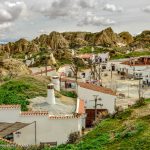 Guadix, a Spanish Hobbiton
An hour away from Granada, hidden between prehistoric karst mountains,( read more...)
Guadix, a Spanish Hobbiton
An hour away from Granada, hidden between prehistoric karst mountains,( read more...) -
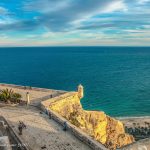 Alicante, Spain with a Nordic vibe
Alicante represents the door to the Southern vibes of Spain.( read more...)
Alicante, Spain with a Nordic vibe
Alicante represents the door to the Southern vibes of Spain.( read more...) -
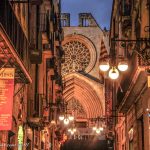 Tarragona, pure magic!
Arriving in Tarragona on the very first night of its( read more...)
Tarragona, pure magic!
Arriving in Tarragona on the very first night of its( read more...) -
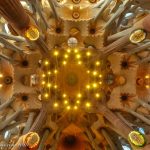 In the sacred woods of La Sagrada Familia
It is truly impossible to describe the feeling I had( read more...)
In the sacred woods of La Sagrada Familia
It is truly impossible to describe the feeling I had( read more...) -
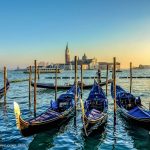 Venice, just a perfect day
Take a sunny day after the Christmas holidays when tourists( read more...)
Venice, just a perfect day
Take a sunny day after the Christmas holidays when tourists( read more...) -
 Northern Lights:The dance of the Green Spirits
For many years one of the most funny stories about( read more...)
Northern Lights:The dance of the Green Spirits
For many years one of the most funny stories about( read more...)

